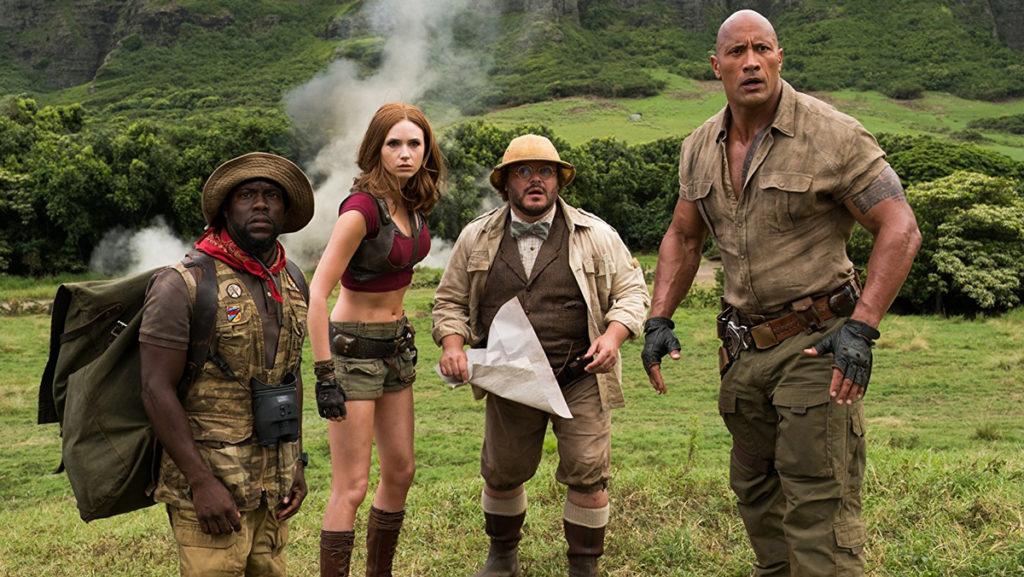Bad computer-generated rhinos chase a bad computer-generated helicopter through a bad computer-generated ravine. After several minutes of high-tension action, the scene culminates in impossible vehicle acrobatics and a few bland quips. Then it’s on to the next lifeless set piece. Rinse and repeat.
From setting to character, nothing in “Jumanji: Welcome to the Jungle” feels genuine.
A partial sequel, partial remake and partial reimagining of 1995’s “Jumanji,” “Jumanji: Welcome to the Jungle” attempts to update the premise of the original. Instead of a magic board game, though Jumanji does show up in that form in the first few minutes of the film, the mystical artifact takes the form of a video game cartridge. Four teens stuck in detention find the game, dust it off and are promptly sucked into the chaotic world of Jumanji. When they enter the game, the “Breakfast Club” wannabes are given new bodies with special skills and weaknesses that complicate their time in the Jumanji jungle. Scrawny Spencer (Alex Wolff) becomes the massive Dr. Smolder Bravestone (Dwayne Johnson), athletic Fridge (Ser’Darius Blain) becomes the tiny Moose Finbar (Kevin Hart), popular Bethany (Madison Iseman) becomes the overweight Dr. Shelly Oberon (Jack Black) and shy Martha (Morgan Turner) becomes the stunning Ruby Roundhouse (Karen Gillan).
Unlike its predecessor, “Jumanji: Welcome to the Jungle” struggles to establish tension. The board game in the original was dangerous because it had the power to impact the real world, unleashing savage creatures on a small town. The characters in the first film had to repel an attack on their homes and their friends. The sequel is set almost entirely inside the game and never presents a compelling consequence for the real world besides the cliched “if you die in the game, you die in real life” conceit. That premise only works if the protagonists are worth investing in — and they’re not.
The characters are straight out of “The Breakfast Club,” which in 2017, and in 1985 for that matter, is a terrible model to imitate. Each of the four leads go through an arc any seasoned moviegoer would expect from a standard big-budget action comedy. Bethany learns to care for others, Spencer learns to be brave, Martha learns to be confident and Fridge doesn’t learn anything. That said, the performances are all appropriately silly, and the chemistry between the four actors is apparent. Watching Johnson and Gillan go through the awkward, tender motions of a teenage relationship is, at times, hilarious and surprisingly sweet. Black owns every scene he is in and does his best Valley girl impression, complete with flamboyant hand gestures and exasperated eye-rolls. The film has a talented cast but a lackluster script.
Despite its numerous shortcomings, “Jumanji: Welcome to the Jungle” deserves recognition for its attempt to spoof a medium Hollywood has yet to understand — video games. The villain, the side characters and many of the set pieces are meant to mimic the cheesy, illogical and often inexplicable aspects of Nintendo Entertainment System-era games. There are some wonderful moments of self-aware humor in the movie that acknowledge the futility of video game quests and the poor justification for classic game plot points.
In an attempt to parody a bad video game, director Jake Kasdan made a bad movie. By acknowledging and embracing the flaws of NES games, “Jumanji: Welcome to the Jungle” also succumbs to them. The villain, John Hardin (Bobby Cannavale), is dull and poorly established, the MacGuffin’s powers are confusing and inconsistent, and the plot is painfully simple. There are also times when the film’s game-related humor sounds like it was crafted by someone who read about video games but never actually played one. Kasdan and crew take some cheap shots that completely backfire. Certain jokes are delivered with an insufferable “can you believe people actually play things like this” tone that undermines the other, more revelatory moments surrounding gaming culture.
“Jumanji: Welcome to the Jungle” is not a painful experience, but it is a distressingly shallow one. The film follows in the footsteps of “Central Intelligence” and “Baywatch”; it’s a bland comedy with a splash of talent, a dash of heart and too little brain. Even Johnson’s boundless, bubbly charisma can’t save this joyless jungle romp.




















